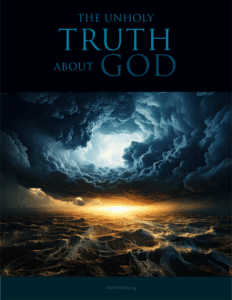



There are 3 parts to this series.
Please be patient and read this entire series of articles as we lay out the truth about God. They lay the ground work that is key to a full understanding of how deep this goes. Prayer: May your spiritual eyes be opened that you can receive this righteous saving message.
And you shall know the truth, and the truth shall make you free.” (John 8:32)
Throughout history, much has been hidden or destroyed in an effort to keep us in the dark. And it has worked, as most of the world is in spiritual confusion. But today, we have the gift of access to more information than any other time in history. So now is the time where we need to review what we know based on what is now available to us that wasn’t before. It may bring to light greater clarity, or even breakthroughs in understanding. But we have to actually seek it to have these breakthroughs. One area that is important to do this in is our understanding of language itself, especially when dealing with biblical understanding, because all of these writings have undergone translation, but the meaning of the words in these texts are critical to our eternal future, so it is crucial that we are certain of what they are speaking to us.
The Bible says our Creator spoke matter into existence:
“He said ‘Let there be light’, and there was light” (Genesis 1:3).
That is the kind of power that lives in the spoken word. It has the ability to uplift, and inspire, but it can also invoke, conjure, and manifest — for good or for bad. In a nutshell, words have consequences.
“But I tell you that everyone will have to give account on the day of judgment for every idle word they have spoken.” (Matt. 12:36)
With this, The Bible is saying that knowing the meaning of the words we use is important, because we will be held accountable for the words we speak, what we put out into the universe.
For example, if we say a word in our own language, but it happens to be derived from an earlier language, the meaning of that word in its original language is the true meaning of that word. If we are using that word today, despite what we use it to mean now, it still has it’s original meaning because of where it came from. There are words we use every day that don’t mean what we think they do: “church” , “God”, “Lord”, etc. So it is important to know history and look to historical record to track meanings so we can understand truly what we are saying.
The same goes for names.
When I go to a country that speaks a different language, I still introduce myself by my name. The name I respond to does not change just because I went to another country and they may speak a different language. I do not identify by anything else but my name, and neither do they. I call them by their name. I do not translate it, because it is who they are, and it is tied to their identity. In order to know them, I must know their name. So why would we translate The Most High’s Sacred Name or call Him something other than His Name that He has told us to call Him by?
Knowing this, let’s talk about this term, “God” and it’s extreme prevalence of use today to refer to The Most High. Where did this term “God” come from?
There are two forms of this word:
The first form of the word, “god” (lower-case “g”) is assumed today to be a generalized term or noun meaning “deity”. If we follow this assumption, then that would mean the word “God” (capitalized, big “G”) would refer to the main deity, the god above all other gods. The problem with this is that built into this conclusion is the recognition of, and therefore the existence of, “gods” plural, suggesting this term to be associated with polytheist belief (belief in many “gods”). This should be a problem for monotheists, because they do not believe there is such a thing as other deities. They believe there is only one – The One.
For those who believe in one deity, why are they calling their deity by a term that is associated with the existence of other deities? This should demonstrate that the term “gods” should not be used to address one Creator deity, and should raise red flags for those in monotheist belief systems as to their use of this word to denote their one deity.
Here is another question: Why would anyone call their deity by a term that is essentially a generic noun, and just capitalize it as their name? That’s like calling everyone you meet “Person”, which would be insulting. The purpose of a name is to identify you and signify your uniqueness. Everyone in the world has a unique name, including deities, so if “God” is a noun, right away every person out there who is reading this, whether monotheist or polytheist, should realize that calling their deity “God” is probably not offering the reverence that deity would want or demand.
So the next logical conclusion might be to suggest that the term “God” is a name. Doesn’t capitalizing something suggest that it is a proper name? What if the word “God” did not derive from a generalized term for deity, but instead was the proper use of the word, ie. a proper name? This once again poses problems for monotheist believers:
One thing would be certain from all of this: “God” is not “The One/ The Most High” believed in by any of these monotheist groups. So why are monotheists calling their Creator this name? And whose name is it? Basically, all this boils down to the fact that no monotheist should be using this name to refer to their Creator, for the sheer reason that they do not truly know who or what “God” is.
What does the Bible say about using other mighty ones names?
“Do not remember the name of other mighty ones, nor let it be heard from your mouth. ” (Exodus 23:13)
This should demonstrate the importance of knowing where the words we are using come from.
Now we can get to finding out who this “God” is that everyone is talking about and praying to!